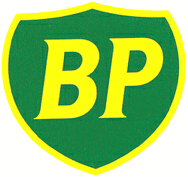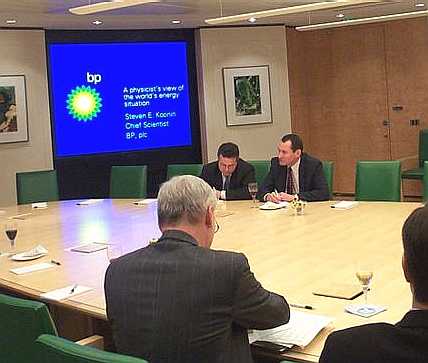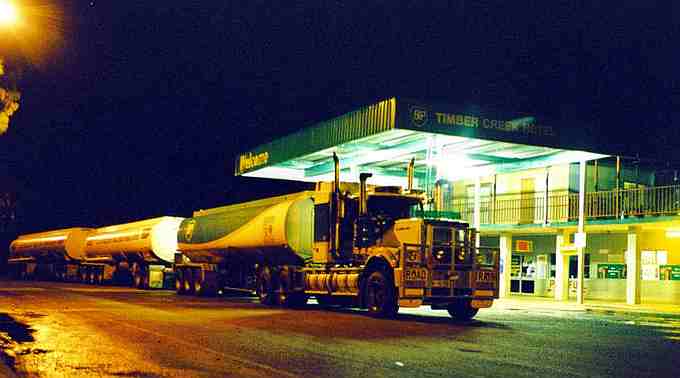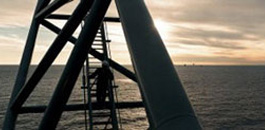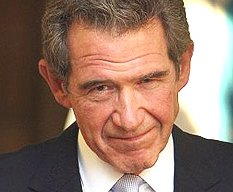|
BP
- British Petroleum International
|
||||||||||||||||||||||||||||||||||||||||||||||||||||||||||||||||||||||||||||||||||
|
Amoco | BP | Chevron | CNCP | ESSO | Exxon | Mobil | Shell | Texaco | Total
BP plc (LSE: BP), NYSE: BP, TYO: 5051 ), originally British Petroleum, is a British energy company / multinational oil company ("oil major") with headquarters in London. The company is amongst the largest private sector energy corporations in the world, and one of the six "supermajors" (vertically integrated private sector oil exploration, natural gas, and petroleum product marketing companies).
The BP logo used from 1989 to 2001
Recent developments
In August 1998, British Petroleum merged with the Amoco Corporation (Amoco), forming "BP Amoco." This move was widely viewed as a takeover of Amoco by BP and considered officially described as a merger for only legal reason (in 2001, "Amoco" was dropped from the corporate name). The newly-renamed "bp" became an initialism no longer overtly standing for "British Petroleum". At the same time BP used the punning tagline "Beyond Petroleum" in some advertising campaigns. The step away from "British Petroleum" was in part a reflection of the fact that BP had become a global business and also that the direct identification of the company as British could be a disadvantage in some areas of operation.
In the 2006 Fortune Global 500 list of companies, BP was ranked 4th in the world for turnover with sales at $268 billion (down from 2nd in 2005 and 1st among oil companies), in the 2006 Forbes Global 2000 it was ranked the eighth largest company in the world.
BP Solar became the third largest producer of solar panels in the world through a series of acquisitions in the solar power industry. Recently, BP announced that its solar, wind and hydrogen power businesses would be known as BP Alternative Energy.
BP is the leading partner in the controversial Baku-Tbilisi-Ceyhan pipeline.
However, BP was indicted by the U.S. Chemical Safety and Hazard Investigation Board for its role in the Texas City Refinery (BP) disaster in 2005, and is being investigated by other US agencies for allegations of market manipulation, and pollution from its pipeline at Prudhoe Bay.
Further controversy occurred at a shareholder meeting on April 12, 2007, when a lavish pension deal was approved for Lord Browne, the outgoing CEO.
Lord Browne unexpectedly resigned suddenly on May 1, 2007 after admitting to lying in court in a case concerning his affair with a male escort. His official departure from the company was not due until later in the year.
Plastic Pollution
Oil derivates are being dumped out at sea. Not only is this a wasted resource and a recycling failure, but also a danger to marine life and ultimately to humans from eating fish that is toxic. The companies listed below operate responsible policies that will hopefully be developed to create a circular economy where ocean plastic pollution is negligible. At that point we will have reached a sustainable society to secure the future of our children.
Origins and history
1909 - 1955
In May 1901, William Knox D'Arcy was granted a concession by the Shah of Iran to search for oil which he found in May 1908. This was the first commercially significant find in the Middle East. On 14 April 1909, the Anglo-Persian Oil Company was incorporated to exploit this find. The company grew slowly until World War I when its strategic importance led the British Government to acquire controlling interest in the company and it became the Royal Navy's chief source of fuel oil during World War I.
In 1920, the war allowed it to take the British arm of the German Europäische Union, which used the trade name British Petroleum. After the war ended, the company, in which the British Government now had a 51% interest, moved to secure outlets in Europe and elsewhere. However, its main concern was still Persia, following the Anglo-Persian Agreement of 1919 the company continued to trade profitably in that country.
In 1931, partly in response to the difficult economic conditions of the times, BP merged their marketing operations in the United Kingdom with those of Shell-Mex Ltd to create Shell-Mex and BP Ltd a company that continued to trade until the Shell and BP brands separated again in 1975.
There was growing dissent within Persia however at the imperialist and unfair position that APOC occupied. In 1932, the Shah terminated the APOC concession. The concession was resettled within a year, covering a reduced area with an increase in the Persian government's share of profits. Persia was renamed Iran in 1936 and APOC became AIOC, the Anglo-Iranian Oil Company.
Following the turmoil of World War II, AIOC and the Iranian government resisted nationalist pressure to come to a renewed deal in 1949. In March 1951, the pro-western Prime Minister Ali Razmara was assassinated and in April, a bill was passed nationalising the oil industry and the AIOC and the Shah were forced to leave the country.
The AIOC took its case against the nationalisation to the International Court of Justice at The Hague, but lost the case. However the government of Britain, concerned about its interests in Iran, convinced the US that Iran was slowly coming under Soviet influence. This was the perfect strategy for the British since the US was in the middle of the Cold War. The British convinced the US to join them in overthrowing the democratically chosen Prime Minister, Mohammed Mossadeq, and to install pro-Western General Fazlollah Zahedi as prime minister of Iran. This overthrow was named Operation Ajax. Mohammed Mossadeq thought that nationalization was the only way to prevent British exploitation of Iran's oil wealth.
On August 19, 1953, the incumbent democratic Prime Minister, Mohammed Mossadeq, was forced from office and replaced by Zahedi and the Shah was recalled. The AIOC became The British Petroleum Company in 1954, and briefly resumed operations in Iran with a forty per cent share in a new international consortium. BP continued to operate in Iran until the Islamic Revolution. However, due to a large investment programme (funded by the World Bank) outside Iran, the company survived the loss of its Iranian interests at that time.
1960s and 1970s
From the late 1960s the company looked beyond the Middle East to the USA (Prudhoe Bay, Alaska) and the North Sea. Both of these fields came on stream in the mid-1970s transforming the company and allowing BP to weather the OPEC-induced oil price shocks of 1973 and 1979. In 1969, BP acquired the Valdez oil terminal, Alaska, from the Chugach for $1. Some natives contend that this was an illegal transfer.
In the mid-1970s, BP acquired Standard Oil of Ohio or Sohio.
1980s and 1990s
P.I. Walters (later Sir Peter Walters) was BP's chairman from 1981 to 1990. Walters promoted a movement to de-integrate company operations based solely upon economic considerations: "For me, there is no strategy that is divorced from profitability," he once remarked. Under his chairmanship British Petroleum led the oil industry away from an era dominated by vertical integration and the supply planning this required toward a corporate culture that emphasised trading and decentralisation (Daniel Yergin, The Prize [Simon & Schuster, 1991], pp. 722-23).
In 1987, British Petroleum negotiated the acquisition of Britoil and those shares of Standard Oil of Ohio (Sohio) through CEO Charlie Spahr not already owned. In 1994, BP and Petroleos de Venezuela SA (PDVSA) began marketing Orimulsion®, a bitumen-based fuel. Lord Browne of Madingley, who had been on the board as managing director since 1991, was appointed group chief executive in 1995.
In the 90s most of Mobil's UK stations were sold off to BP, with them becoming BP Service Stations. The rest were turned into Essos which is the local name for Exxon in the UK.
Chief Scientist of BP, Steven Koonin (top right, with computer) speaks about the energy scene in the boardroom in 2005
Present
British Petroleum merged with Amoco (Formerly Standard Oil of Indiana), in December 1998, becoming BPAmoco until 2000, when it was renamed BP and adopted the tagline "Beyond Petroleum," which remains in use today. It states that BP was never meant to be an abbreviation of its tagline. Most Amoco gas stations in the United States have changed the look and name to the bp brand. In many states, however, BP is selling Amoco branded gasoline, as it was rated the #1 petroleum brand by consumers 16 years in a row (the name of the service station itself is still BP) and Amoco has one of the highest brand loyalty for gasoline in the US with only Chevron and Shell having such high rates as BP/Amoco. In 2000, British Petroleum acquired Arco (Atlantic Richfield Co.) and Burmah Castrol plc.
In April of 2004, BP decided to move most of its petrochemical businesses into a separate entity called Innovene within the BP Group. Their intention was to sell the new company possibly via an Initial Public Offering (IPO) in the US, and in fact they filed their IPO plans for Innovene with the New York Stock Exchange on September 12, 2005. However, on October 7, 2005, BP announced that they had agreed to sell Innovene to INEOS, a privately held UK chemical company for the sum of $9 billion, thereby scrapping their plans for the IPO.
On March 23, 2005, an explosion occurred at BP's Texas City Refinery in Texas City, Texas. It is the third largest refinery in the United States and one of the largest in the world, processing 433,000 barrels of crude oil per day and accounting for 3% of that nation's gasoline supply. Over 100 were injured, and 15 were confirmed dead, including employees of the Fluor Corporation as well as BP. BP has since accepted that its employees contributed to the accident. Level indicators failed, leading to overfilling of a heater, and light hydrocarbons spread throughout the area. An unidentified ignition source set off the explosion. [1]
According to some private BP-branded gasoline center operators in the Metro Atlanta area, BP plans to leave the Southern Market in the next few years. All corporate-owned BP stations, typically known as "BP Connect" will be sold to local jobbers.
In March of 2006, one of BP's pipelines in the North Slope of Alaska ruptured, causing a major environmental hazard. [2]
BP has recently started to move its oil exploration activities away from the North Sea and Alaska and is looking into the former Soviet Union for its future reserves. On July 19, 2006, BP announced that it would close the last 12 out of 57 oil wells in Alaska, mostly in Prudhoe Bay, that had been leaking. The wells were leaking insulating agent called Arctic pack, consisting of crude oil and diesel fuel, between the wells and ice.
On 12 January 2007, it was announced that Lord Browne would retire at the end of July 2007. The new Chief Executive will be the current head of exploration and production, Tony Hayward. It had been expected that Lord Browne would retire in February 2008 when he reached the age of 60, the standard retirement age at BP. Browne resigned abruptly from BP on 1 May 2007, following the lifting of a legal injunction preventing Associated Newspapers from publishing details about his private life. Hayward succeeded Browne with immediate effect.
As of February 11, 2007 BP announced that they would spend 8 billion dollars over ten years to research other methods of fuel.
Prudhoe Bay shutdown
As of August 7, 2006, BP has begun to shutdown oil operations in Prudhoe Bay, Alaska, due to corrosion in the pipeline. This corrosion is caused by sediment collecting in the bottom of the pipe, protecting corrosive bacteria from chemicals sent throught the pipeline to fight this bacteria. Prudhoe Bay produces about 2.6% of the United States demand for gasoline. It was initially estimated that the shutdown would cause a reduction of 400,000 barrels per day and reaction to that scenario was a contributing factor pushing the price of oil to over $77(USD) per barrel.To, date 1,513 barrels of liquids, about 5,200 cubic yards of soiled snow and 328 cubic yards of soiled gravel have been recovered. There are estimates that about 5,000 barrels of oil were released from the pipeline. After further analysis and approval from the DOT, only the eastern portion of the field was shut down which resulted in a reduction of 200,000 barrels per day until work began to bring the eastern field to full production on Oct 2.
Solar panel made by BP Solar
In 2000 the company was renamed BP, with no meaning given to the letters. Its new slogan, "Beyond Petroleum", was accompanied by the rebranding of its famous "Green Shield" logo in favour of the helios symbol (a green and yellow sunburst) to emphasise the company's focus on environmentally friendly fuels and alternative energy. This is intended to move BP away from the negative environmental image of most oil companies. However, some environmental groups have accused BP of trying to greenwash their public image, and that their alternative energy credentials are not serious investments but merely a PR exercise.
BP is a leading producer of solar panels since its purchase of Lucas Energy Systems in 1980 and Solarex (as part of its acquisition of Amoco) in 2000. BP Solar had a 20% world market share in photovoltaic panels in 2004 when it had a capacity to produce 90 MW/year of panels. It has over 30 years experience operating in over 160 countries with manufacturing facilities in the U.S., Spain, India and Australia and has more than 2000 employees worldwide.
BP/Amoco was a member of the Global Climate Coalition an industry organisation established to promote global warming skepticism but withdrew in 1997, saying "the time to consider the policy dimensions of climate change is not when the link between greenhouse gases and climate change is conclusively proven, but when the possibility cannot be discounted and is taken seriously by the society of which we are part. We in BP have reached that point.".
In February 2002 BP's chief executive, Lord Browne of Madingley, renounced the practice of corporate campaign contributions, noting: "That's why we've decided, as a global policy, that from now on we will make no political contributions from corporate funds anywhere in the world." [3]
In March 2002 Lord Browne of Madingley declared in a speech that global warming was real and that urgent action was needed, saying that "Companies composed of highly skilled and trained people can't live in denial of mounting evidence gathered by hundreds of the most reputable scientists in the world.".[4] In 2005 BP was considering testing carbon sequestration in one of its North Sea oil fields, by pumping carbon dioxide into them (and thereby also increasing yields).[5]
In 2004, BP began marketing low-sulphur diesel fuel for industrial use. BP intends to create a network of hydrogen fuelling stations in the state of California.
Disaster
One of BPs largest refineries in the USA exploded in 2005 causing 15 deaths. The fall-out from the accident continues to cloud BPs corporate image because of the mis-management at the plant. There have been several investigations of the disaster, the most recent being that from the U.S. Chemical Safety and Hazard Investigation Board. It was preceded by the Baker report and BPs own internal investigation.
Essentially, a large column filled with gasoline overflowed to form a vapour cloud, which ignited. The explosion caused all the casualties and substantial damage to the rest of the plant. The incident came as the culmination of a series of less serious accidents at the refinery, and the engineering problems were not addressed by the management. Maintenance and safety at the plant had been cut as a cost-saving measure, the responsibility ultimately resting with executives in London. The disaster led to the premature resignation of Lord Browne, and will continue to affect the company for some time to come.
However, Lord Browne resigned before his due date in August 2007, essentially because he had lied in a court action concerning his private life. He resigned on May 1st 2007 when the facts were revealed to the public.
BP petrol station using the 1989-2001 logo
West Papua
BP has come under heavy criticism from human rights groups, especially the Free West Papua campaign for developing a massive natural gas project in the region. This project will fund the Indonesian occupation of West Papua and has not been agreed by the West Papuan people. Furthermore BP have gone into business with the Indonesian regime without criticising the occupation (which has killed more than 100 000 people). Comparisons have been drawn between BP's presence in West Papua, Shell's presence in Nigeria and Total's presence in Burma. A leaflet published by the Free West Papua campaign used the letters "BP" as initials for "bleeding papua".
Other Problems
However, BP's image has been tarnished somewhat by its involvement with the controversial Baku-Tbilisi-Ceyhan pipeline, criticised for human rights abuses, environmental and safety concerns.
BP has also been criticised for the increase in fuel prices in the UK, on April 25 2005 Lord Browne stated in an interview with the BBC that he fully expected petrol prices to stay above £1 per litre. [6] BP has also been involved in bringing lawsuits against biofuel and biodiesel producers and sellers in France and other countries.
In July 2006, a group of Colombian farmers won a multimillion pound settlement from BP after the British oil and gas company was accused of benefiting from a regime of terror carried out by Colombian government paramilitaries to protect a 450-mile pipeline.[7]
On August 7, 2006, BP reported that their Prudhoe Bay oil field had to be shut down after a pipeline inspection gauge determined there was excessive corrosion in the transport pipeline. BP was criticized for the maintenance practices on the damaged pipeline, which was last inspected for corrosion in 1992.
BP have started a scheme for car owners to purchase carbon offsets called Target Neutral.
As of February 11, 2007 BP announced that they would spend 8 billion dollars over ten years to research alternative methods of fuel. A $500 million grant offered to the University of California, Berkeley, Lawrence Berkeley National Laboratories, and the University of Illinois at Urbana-Champaign, to create an "Energy Biosciences Institute" has recently come under attack, over concerns about the global impacts of the research and privatization of public universities.
BP Retail Brands
This is BP's flagship retail brand name with BP Connect Service stations being operated around the UK, Europe, USA, Australia, New Zealand and other parts of the world. BP Connect sites feature the Wild Bean Cafe which offers cafe style coffee made by the staff and a selection of hot food as well as freshly baked muffins and sandwiches. The food offered in Wild Bean Cafe varies from each site. BP Connect sites usually offer table and chair seating and often an Internet kiosk.
This was the flagship BP brand prior to the introduction of BP Connect in 2000. There are still some BP Express sites operating around the world but most have been either upgraded to Connect or changed to an alternative brand. BP Express offers a bakery service but doesn't have the selection of food offered in the Wild Bean Cafe and usually coffee is only available through a self service machine.
Commonly used on smaller sites mainly independently owned sites. Products vary in each BP Shop but usually a selection of convience store style food and automotive products.
A franchise brand used for independently operated sites in New Zealand. BP 2go sites mainly operate in towns and outer suburbs in New Zealand. BP 2go offers similar bakery food to BP Connect but in a pre-packaged form. Some BP Express sites around New Zealand that were considered too small to be upgraded to BP Connect were given the option to change to BP 2go others were downgraded to BP Shop. Staff at BP 2go sites wear a different style of uniform to the rest of the BP branded sites.
About BP Environment and society Products and services Investors Press Careers
Fuels and stations, Fuel cards, Gas (LPG), Lubricants, Gas (LPG), Solar, Online store Introducing BP Ultimate Fuels, Fuel cards, Gas and power, Lubricants, Solar and renewables, Petrochemicals, Bitumen, Air BP, BP Marine Record Annual Result, Up 42%; Continuing Strong Cash Generation BP Board Announcement BTC Signs Project Finance Agreements Annual Report 2002 Statistical Review of World Energy Supplementary F&OI
NOTE: Company donations are 100% tax deductable. Gift aid may go to support your chosen projects.
Contact BP | BP Reports and publications | BP worldwide | BP Home
BP produce a range of high efficiency solar panels to suit boating and other recreational vehicles. This page links to BP's site where a number of examples are given as to successful applications:-
BP Solar International Solar Applications Homes & Recreation BP Solar Home Solutions™ Recreational Vehicles & Boats RV & Boat Projects about solar power products & services solar applications
To quote BP: "If you spend time in camper vans or RV's solar can provide the clean power solution. The watertight, low or no maintenance solar panels can power your camper van, RV or boat, charge your car battery so extending its life, power your computer, radio or TV. If you're getting away from it all, solar lets you get away from the noise, hassle and pollution of diesel generators, crowded marinas and busy campsites. By charging long-life battery sets, you can rest assured you'll have energy for use through the day and night".
Solar Navigator extends this ethos to use silent clean renewable energy to propel a large ocean going catamaran - and provide energy for navigation, entertainment and life support. It is only with research such as our expedition generates, may the frontiers of technology be extended for the benefit on mankind.
Edmund John Philip Browne, Baron Browne of Madingley, FRS FREng (born February 20, 1948) is President of the Royal Academy of Engineering and was group Chief Executive of BP until his resignation on May 1, 2007.
Browne was born in Hamburg, Germany, to a British Army officer and a Hungarian Auschwitz survivor. His father also worked in civilian life for Anglo-Persian Oil, which later became British Petroleum. He was educated at the King's School, Ely and St John's College, Cambridge, where he earned a First Class Bachelor's degree in Physics; he later obtained an MS from Stanford Business School. In May 2003, he was awarded an honorary Doctor of Engineering degree from the Colorado School of Mines.
Lord Browne
Career
At the suggestion of his father, Browne joined BP as an apprentice in 1966 while still at university and remained with the corporation throughout his career. In 1969 Browne worked as a BP field engineer in Anchorage, Alaska. He was appointed group chief executive in 1995.
It was announced on 25 July 2006 that Browne would stand down as chief executive of BP in December 2008, 10 months after his 60th birthday. There had been press speculation that he had wished to continue beyond this date, but he made it clear that he did not wish to do so. On 12 January 2007, it was announced that his retirement date has been brought forward to July 2007 and that he would be succeeded by Tony Hayward.
Lord Browne resigned from BP on 1 May 2007, following the lifting of a legal injunction preventing Associated Newspapers from publishing details about his private life. In a statement, he confirmed that he had lied to a court in an attempt to cover up his four-year homosexual relationship with a male escort called Jeff Chevalier, leading to Browne's resignation.
Green issues promoted by Browne
From 1997, Browne challenged oil industry rejection of global warming and sought to recreate BP as a "green" energy company. The company linked itself in its corporate communications with green issues by the overt link of its BP initials with the phrase "Beyond Petroleum". Though many dispute that an oil company can truly be environmentally sensitive, Browne has stated that the right to heat, light and mobility are crucial for people everywhere and that he sees his company's mission as to find ways to meet current needs without excessive harm to the environment, while developing future, more sustainable sources of energy. He has promised that BP will cut its emission of greenhouse gases by 10% by 2010.
Life outside BP
Lord Browne lists fine cigars, antique furniture, opera and the arts among his interests. He was one of the highest paid executives in the UK with a remuneration package of approximately £5.7 million in 2004. He became President of the Royal Academy of Engineering in July 2006. He took over from Frances Cairncross as President of the British Association for the Advancement of Science in September 2006, and was elected a Fellow of the Royal Society in 2006. In 1998, he was knighted by Queen Elizabeth II and in 2001 named as one of the "people's peers" taking the title Baron Browne of Madingley in the County of Cambridgeshire, and becoming a crossbencher (independent member) in the House of Lords.
He is a non-executive director of Goldman Sachs, a trustee of the British Museum, a member of the Governing Body of the London Business School and a member of the Supervisory Board of DaimlerChrysler AG. He is also emeritus chairman of the Advisory Board of the Stanford Graduate School of Business and the Judge Business School, Cambridge as well as a trustee of The Conference Board, Inc. and a vice president and member of the board of the Prince of Wales Business Leaders Forum. In late 2006 he was appointed Chairman of the private equity firm Apax Partners.
Resignation
Lord Browne resigned from BP on 1 May 2007. After a court case lasting over four weeks, Browne appealed to the Judicial Committee of the House of Lords, who ruled that he could not prevent a newspaper from printing allegations about his personal life and alleged misuse of company funds.
Sources say he paid his Canadian boyfriend Jeff Chevalier throughout their four-year relationship, and when Chevalier moved back to Toronto at the end of the relationship, Browne paid for 12 months of a lease on an apartment.
Lord Browne says felt he was under pressure to resign due to UK newspaper Mail on Sunday revelations about his personal life and relationship with Chevalier. As part of a statement made at the time of his resignation, he commented "In my 41 years with BP, I have kept my private life separate from my business life. I have always regarded my sexuality as a personal matter, to be kept private. It is a matter of deep disappointment that a newspaper group has now decided that allegations about my personal life should be made public."
It is not yet clear how his resignation from BP will affect his future plans. BP were also due to give him a large leaving payout of over £5m and £21m pension on his scheduled departure in summer 2007, which may be affected by his resignation.
It is also possible that Browne will face charges of perjury, over lying to the court over how he met Chevalier. Browne in court initially said the pair had met when they were both exercising in Battersea Park, which was dismissed by the court and Browne later admitted was a lie. Newspapers reports suggest that Browne actually met Chevalier via a gay dating website.
However, Mr Justice Eady, the presiding judge in the case, has said he has decided not to refer the matter to the attorney general with regard to possible perjury charges, saying disclosure in the judgment of Lord Browne's behaviour was "probably sufficient punishment".
BP's Browne quits over lie to court about private life
The career of one of the titans of British industry came to a dramatic end yesterday when Lord Browne quit as chief executive of BP after lying to a court about his relationship with another man.
Following crisis talks at the company's London headquarters, BP said Lord Browne had resigned with immediate effect after losing his four-month battle to suppress newspaper reports about the relationship. In doing so, he forfeited a leaving package worth up to £15.5m.
Lord Browne went all the way to the House of Lords in his attempts to prevent Associated Newspapers, the publisher of the Mail on Sunday, from disclosing details of his relationship with Jeff Chevalier, his Canadian partner between 2002 and 2006.
A series of hearings considered evidence about the pair's extravagant international lifestyle, disputed allegations that company resources were diverted for Mr Chevalier's use, and claims - firmly denied - that Lord Browne attempted to evade tax payments.
The 58-year-old, once hailed as "the Sun King of the oil industry" lost his case, in large part, because he claimed to have met his partner while jogging in a London park. They had, his close associates conceded last night, made contact through a male escort agency's website.
In a statement which marked the end of a remarkable career, including a decade during which the company he led was regarded as the country's most successful, Lord Browne said: "In my 41 years with BP I have kept my private life separate from my business life. I have always regarded my sexuality as a personal matter, to be kept private. It is a matter of deep disappointment that a newspaper group has now decided that allegations about my personal life should be made public.
"I wish to acknowledge that I did have a four-year relationship with Jeff Chevalier, who has now chosen to tell his story to Associated Newspapers. These allegations are full of misleading and erroneous claims. In particular, I deny categorically any allegations of improper conduct relating to BP."
Tony Hayward, Lord Browne's designated successor, who had been due to take over in July, was immediately appointed as chief executive.
The disclosure of the relationship follows the refusal by the House of Lords yesterday to grant Lord Browne permission to appeal against rulings made earlier this year by the high court and court of appeal.
The high court had decided to lift an injunction which covered a wide range of subjects, including alleged discussions between Lord Browne and Gordon Brown, Tony Blair and EU commissioner Peter Mandelson, and a dinner at one of Lord Browne's homes attended by himself and Mr Chevalier with Mr Mandelson and his Brazilian partner.
Another was a claim that Lord Browne bought a flat in Venice several years ago and, it was alleged, paid cash for a renovation bill which did not include VAT, and that he failed to pay his tax bill.
The court also heard that Lord Browne took steps to enable Mr Chevalier to remain in the UK when his visa was due to run out early in the relationship. This included paying for a university course from 2003, so he would acquire student status, and helping him to set up a company to trade in mobile phone ring tones.
Mr Chevalier claimed that when the relationship broke down Lord Browne had agreed that "if needed, [he] would assist in the first year of me transitioning from living in multimillion pound homes around the world, flying in private jets, five-star hotels, £2,000 suits, and so on to a less than modest life in Canada".
The judge, Mr Justice Eady, said Mr Chevalier sought further assistance towards the end of last year, backed by what he said could be interpreted as a "thinly-veiled threat". Mr Chevalier denies making any threats.
Eventually, Lord Browne's attempts to prevent reporting of these matters, and to maintain his personal privacy, collapsed after the court accepted he had lied to conceal the manner in which he met Mr Chevalier. Lord Browne had told the court on more than one occasion that they had met while running in Battersea Park, south London. In fact, associates of Lord Browne now acknowledge, they met through a website called suitedandbooted.com.
Mr Justice Eady said: "I am not prepared to make allowances for a 'white lie' told to the court in circumstances such as these - especially by a man who prays in aid of his reputation and distinction, and refers to the various honours he has received under the present government, when asking the court to prefer his account of what took place."
The judge added that Lord Browne told this lie at a time when he was also making a "wholesale attack" on Mr Chevalier's reliability, showing a "willingness casually to 'trash' the reputation" of his former partner.
The Mail on Sunday said it would make its evidence available to the attorney general, Lord Goldsmith. "Jeffrey Archer and Jonathan Aitken went to prison for lying to the courts," a spokesman said.
However, Mr Justice Eady said he had decided not to refer the matter to the attorney general, saying disclosure in the judgment of Lord Browne's behaviour was "probably sufficient punishment".
In a statement last night the Mail on Sunday said: "The story we originally sought to publish was a business story involving issues of great importance to shareholders and employers of BP. Lord Browne chose to suppress this story by arguing to the high court that, because the story was supplied to us by his former lover, Mr Chevalier, it breached his right to a private life under the Human Rights Act." In lying, the newspaper said, it was Lord Browne who had made his private life a public issue.
LINKS and REFERENCES
Youtube
Amoco | BP | Chevron | CNCP | ESSO | Exxon | Mobil | Shell | Texaco | Total
|
||||||||||||||||||||||||||||||||||||||||||||||||||||||||||||||||||||||||||||||||||
|
This
website is Copyright © 2014 Max Energy Limited.
The names Bluebird, Solar Navigator™,Blueplanet Ecostar BE3™, Utopia Tristar™
and the blue bird in flight
|
